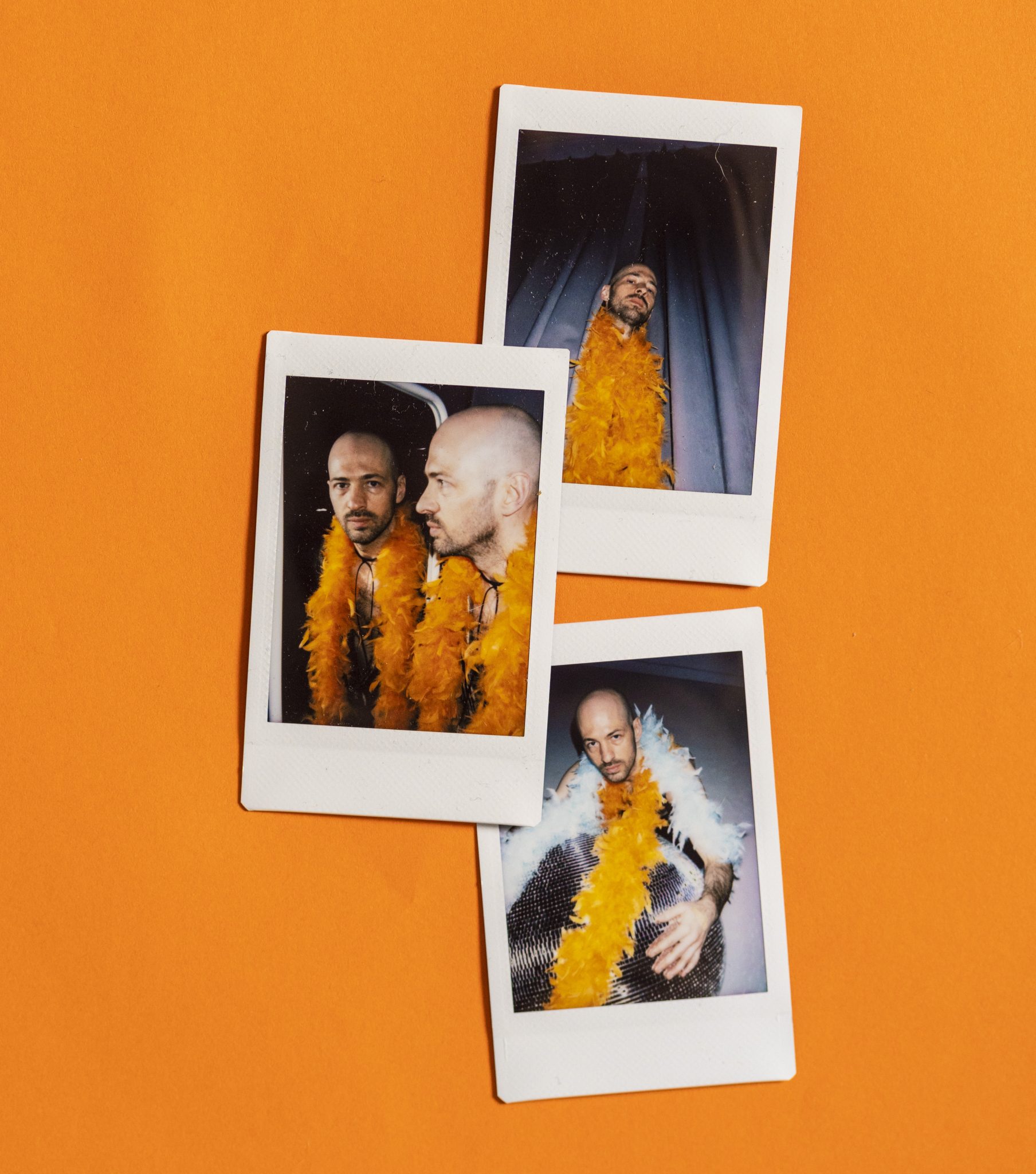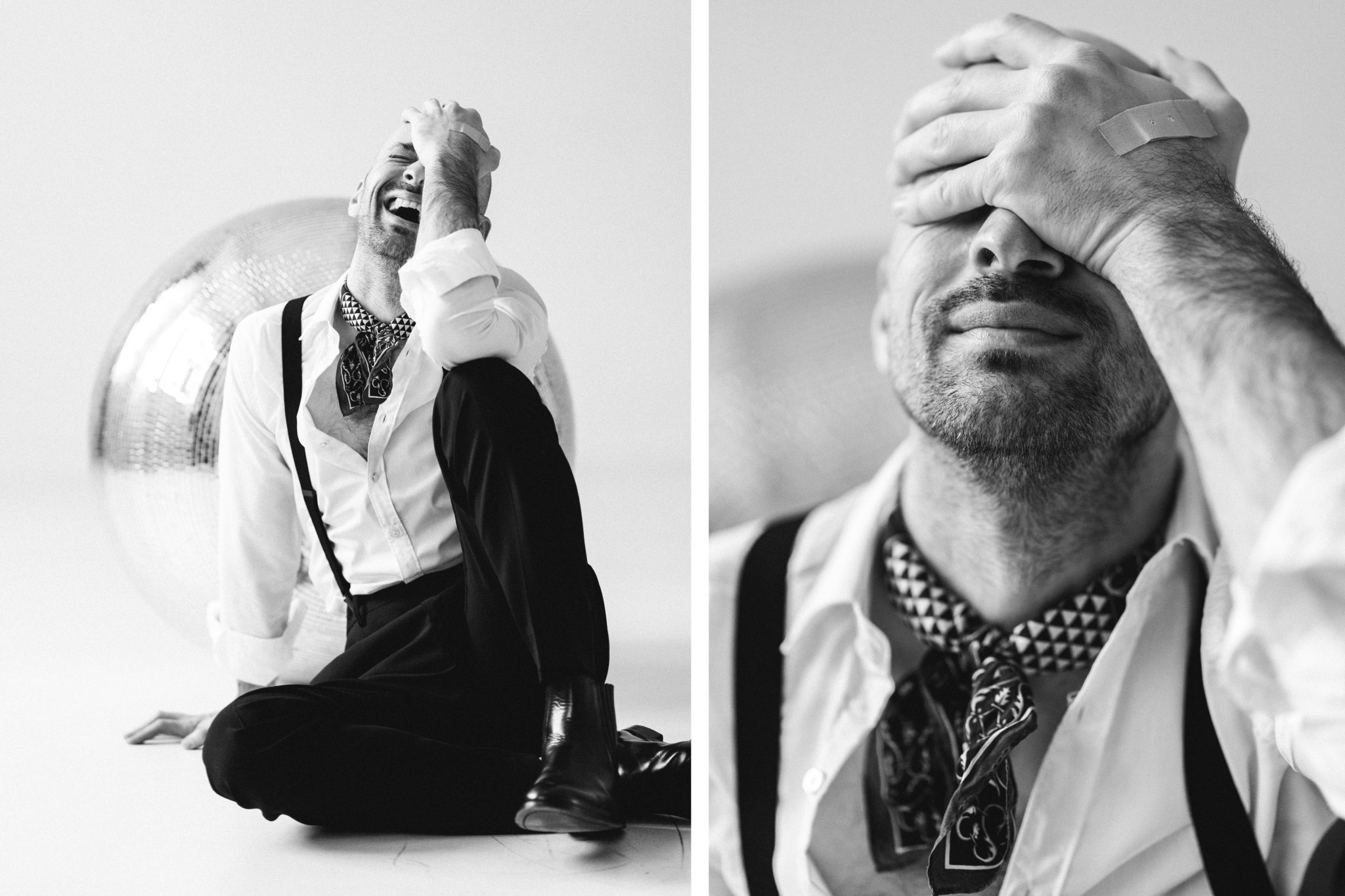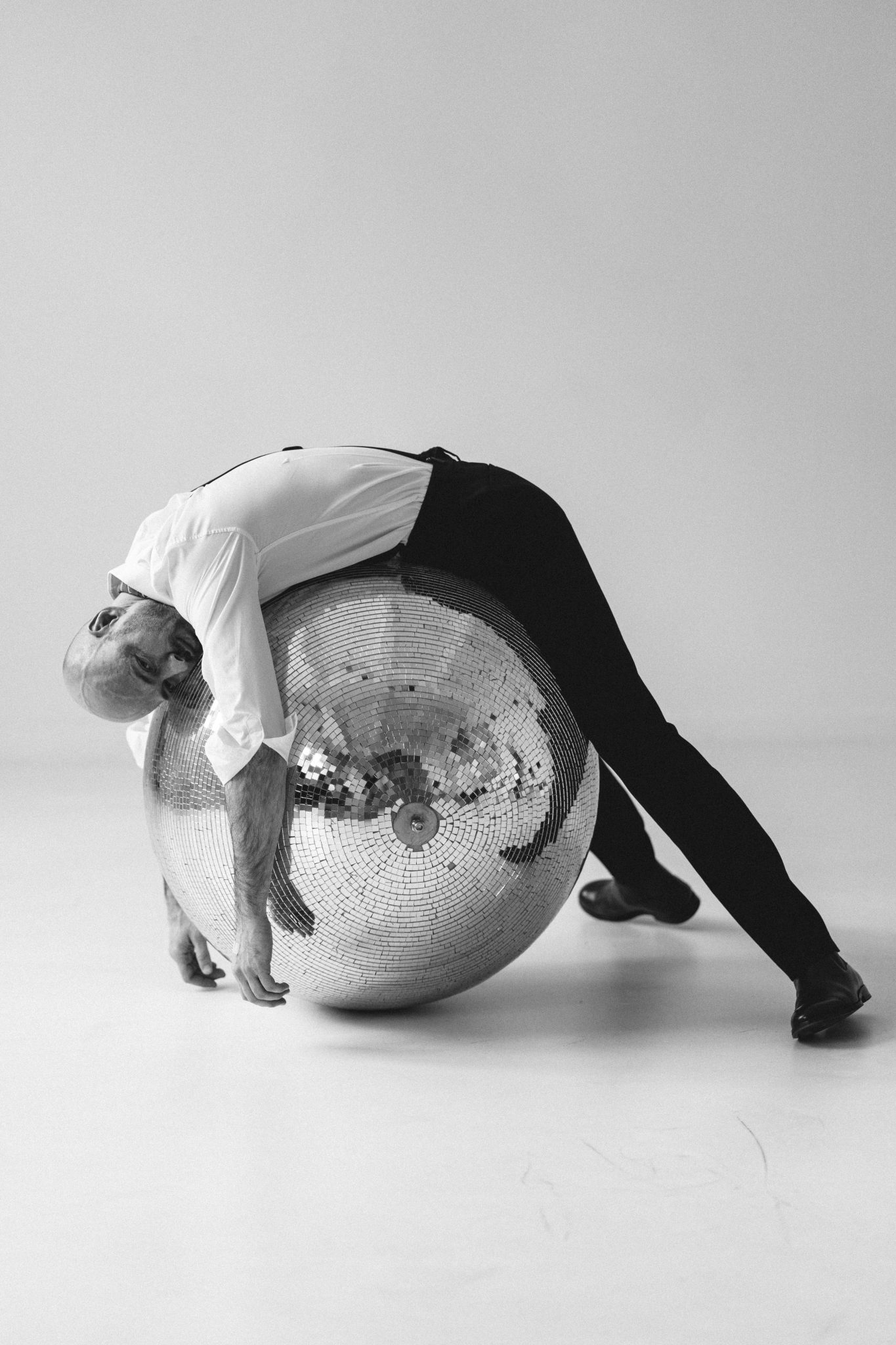István Téglás: I got over the need to prove something as an actor
Before leaving for the Berlinale, I met with István Téglás, starring in Sebastian Mihăilescu’s debut film “Mammalia”, selected this year in the Forum section. We talked about the significance of art and the inner demons we struggle with after the pandemic years.
***
We met one Friday at a studio in the east of Bucharest, where we were going to have the photo shoot for the interview. We had originally planned to meet at my house, but I was looking forward to a deeper conversation and the traffic would have cut our interview time in half. It was a cold but clear day, which I had spent going over the questions dozens of times. I had seen István in several memorable plays as well as in different films, I had many curiosities and just as many doubts that we would have enough time for all of them. When I arrived, István was already there. He had already made friends with the assistant at the studio and they were watching videos on their phones, laughing out loud. We moved to the kitchen table and got started right away. I recognized the honest and brave man in his statements and discovered a person who constantly wants to evolve and experience new things.
For those who do not know István Téglás – already a well-known figure in the local artistic bubble, I recommend you to go see him on stage, but for context, here are some essential facts – he was born in Baraolt, where he grew up with his sister and their mother. He discovered theatre during school summer camps, which motivated him to pursue acting. He applied to the theatre university in Târgu Mureș and got in first. He has been living in Bucharest for the past 16 years, where he arrived thanks to a dear friend and choreographer – Vava Ștefănescu. He is an actor at the National Theatre and one of the few artists in Romania who harshly criticises the state cultural institutions, every time they deserve to be sanctioned.

What are you struggling with these days, István? Have the last few years clogged with sad news from around the world affected you?
I try to stay away from socio-political issues; it’s been too much of that lately and it has consumed me. On the other hand, I tried to do my part, but I can’t say it’s made a great difference. I struggle with these big issues that need to be dealt with. And then with the little things that are a part of everyday life.
Reading the journal you wrote for Scena9, I could relate to your obsessive fear of death. I’m curious, where does it come from?
I don’t know exactly. But I’d say it’s a thought rather than an overwhelming fear. And I don’t mean suicidal thoughts, that’s out of the question. It comes from small things like crossing the street.
How important is the opinion of others to you? – both as an actor and as a person.
Unfortunately, it used to be very important, it was everything to me. Now it’s not as vital as it once was, on the contrary, it affects me less and less. And I think it comes with life experience.

You studied acting in Târgu Mureș, you entered with the highest grade, but the college years were hard, you didn’t feel like you could fit in. Why is that? What was wrong with the school?
I was a novice and I felt there was something wrong with their way of teaching, like they didn’t have the experience and tools to teach acting. Of course, it also depends on the person. Now I know teachers, both there and at other universities, who are very good, but back then, I didn’t even understand if I was talented or not, it was really hard for me in that sense. I had only one good teacher, but she was not teaching acting – Éva Papp, it is said that she is the most talented graduate of the theatre school in Târgu Mureș.
Today you are one of the most appreciated actors of your generation – especially in theatre, but you’ve also worked on a significant number of film pproductions. What does each of the two worlds bring you and what does it represent for you?
I feel that cinema is much more rooted in the present, that it’s far closer to who I am and to how I see art – at least through the lens of the projects I’ve worked on.
Theatre has lost almost its all meaning to me – it’s more like a job. I no longer have any expectations when it comes to theatre.
Fortunately, I work on projects that I like. I haven’t had to work with directors I don’t care about.
And what does art mean to you?
I can’t say that I know what art is, perhaps it’s a way of living. I haven’t done anything else so far [i.e. apart from acting] and it’s been frustrating a bit lately. I got over the need to prove something as an actor. Since I finished acting school, I haven’t had time to do anything else – not even on a personal level. I was in a 15-year-long relationship, which was also consumed in theatre and through theatre. I haven’t seen the world, I don’t even know Bucharest, if you can believe it.

It took a lot of courage for you to get out of a relationship after 15 years.
In a way I regret it. I wouldn’t go back, but it’s very hard. It was an addictive relationship – I have a pattern, and I’ve even read about it, that it’s almost impossible to get out of this pattern, even if you get out of an unhealthy relationship. And I struggle with that (going back to your first question).
But have you asked yourself what love looks like for you, in its most genuine and beautiful form?
I don’t know because I haven’t experienced it. And I feel sorry for myself. I’m afraid to dream too big because I don’t want to deceive myself and sink into depression – that’s a struggle, too.
I think you have a fantastic ability to internalise the feelings of your character and make them part of you. Whenever I see you play, you are always very convincing while still keeping your own self. István exists in every role, in greater or lesser amounts.
Personally, I find that quite terrible, and I’ve seen myself in all the films I played in. Mammalia has been the only exception so far, it was the first time I could only see the character and none of me in him, which made me incredibly happy. But I think it was no coincidence that I could see myself in all the other characters, most of the directors wanted that. They meant to leave part of me in the character.

You brought up Mammalia, Sebastian Mihăilescu’s debut feature, which will have its world premiere at the Berlinale in the coming days. Did you work on a specific script or was it rather based on improvisation?
We had a script a few years ago. Sebastian and I have known each other for a very long time, we worked on some video projects and short films when he was a student, and we met to talk about this film. He had written the script with me in mind, I was very flattered. It was a draft, so naturally I thought there would be some changes along the way. A year passed and I didn’t receive any sign. I, myself, had forgotten about the project – we met one summer and he told me that the shooting would be in a year. Then I heard he was casting for the film. I was confused. After a while, I was called to audition but didn’t take the part. After another month or so, he called me to ask me if I didn’t want to play the main role.
We’ve had several versions of the script all this time. I got the final version before the shoot but was eventually put aside (laughs). So, yes, there was a lot of improvisation.
But did you talk about the character, did you imagine him in a certain way?
Yes, we talked a lot about the character but also about the focus of the film. We only had a few rehearsals before the shoot, it was rather to get familiar with the location and the spaces.
What helps you in understanding a character?
Finding his sensibilities. I think acting happens through empathy – I don’t have an acting technique, so maybe it wasn’t so bad that I wasn’t taught any technique (laughs). But yes, I think empathy is important; for example, if I see a bully on the street, I can’t empathize with them, but if I see them in another situation, I can relate to things. And when the script doesn’t give me such details, I invent them myself (laughs). It is much more difficult when playing a supporting character, especially in theatre – a main role is written head to toe.
I think acting happens through empathy.

Mammalia is the first film you played in that was produced after the pandemic. Has the pandemic changed your way of working as an actor?
No. Before the pandemic, I was in a burnout. At the premiere of UFO (staged by Bobi Pricop), I had a rather long monologue, about 7 minutes long, and I felt like I wanted to vomit – it had turned into a physical problem, I couldn’t go on like that anymore, I was exhausted. During the pandemic, I found my rhythm and began to focus more on myself.
Your character is in a dysfunctional relationship that he’s obsessively hanging on to, he leads a mundane and unsatisfying life that torments him —
A fairly common situation, I would say (laughs).
Until the moment he discovers the bizarre community his wife had joined. What changes for Camil once he gets there?
First of all, his perception. He opens up to the unknown and gets to better understand the person next to him, his wife.
Are there any memorable moments from the shoot? Do you have any bizarre stories worth telling?
So many. We were shooting the scene where I was at my boss’s house, and on the kitchen counter there was the parrot’s cage. I had no lines, I just had to be in the frame. I got quite close to the parrot’s cage, which I don’t know how but managed to open the cage by itself and fly right over my head. It was a surreal moment, visually speaking, but unfortunately didn’t make the cut.

You worked both with established directors of the New Wave as well as with younger ones, who seem to make a change in the local industry. How would you define the new generation of filmmakers? What do they keep from the older generation and what do they bring new to the table?
The younger ones have picked up quite a few things from the older generation, but I think it has to do with having them as teachers. Cristi Puiu was Sebastian’s teacher at one point, and Ana Lungu was his assistant on one of his first films. But what they managed to do is to transform the lessons, to personalise them. Ana Lungu starts from real situations in the actors’ lives, which she then fictionalizes. And Sebastian has a very personal style, which materialises into new forms of storytelling.
Do you have limits as an artist?
As an artist, no. But as a person, I feel that as I’ve been getting older I have started to have some limits.

Film producer and founder of ADFR, she dreamed since she was little of having a magazine one day. Alongside her job as editor-in-chief, she writes the interview of the month. She loves animals, jazz music and films festivals.
